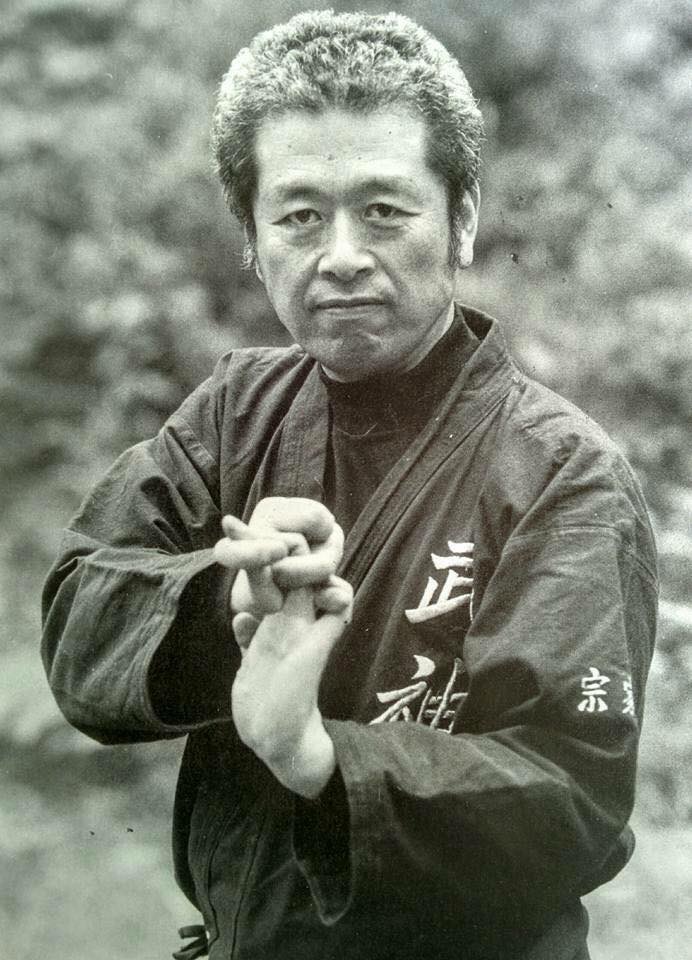Teachers are indispensablel notjust for warriors. If you find a magnificent mentor and train diligently, you will be able tobecome a marvelous warrior, but if you follow a martial merchant, it is highly questionable whether you will be enlightened as to the true martial arts. In the old days there were two forms of Deshi-iri: those who entered into the martial arts in search of a good teacher (the “questing “type), and those who were discovered by a teacher as they trained in the mountains, unaware ( the “sudden” type). In each case, the teacher would judge whether or not this person was fit to be a martial artist. Those applying for Deshi-iri in the old days would first be given duties such as chopping wood or cleaning. They would chop wood and clean earnestly from dawn to dusk, for several years. The teacher would be examining the pupil’s potential as martial artist material throughout this period, by discerning whether he had a straightforward nature and sufficient guts to be able to persevere with the martial arts. Then, picking his moment, he would initiate the next stage: “Come to the Dójó, I’Il give you some training”. As the fierce training continued remorselessly day after day, the pupil would learn to appreciate his teacher, learn the depth of his affection, and mature into a true student. Nowadays, the people who come and ask to be my student are quite varied. Some are of a frail type, weak in both body and mind and desiring to become strong; some are of an intellectual type, desired to make their spirit strong; some are of a combative type who simply wantto be strong in the martial arts- ー but they are all part of the “mood “set, in that they all have an intense longing for Budó. I tell such people quite unreservedly:
“If you want to forge your spirit, train in religion or the like-in martial arts you learn the top techniques of murderers. You want to strengthen your body? Go for walks, do body building and eat plenty of vegetables. you hope to achieve by being strong in the martial arts? You can’t win any trophies, and you won’t make a fortune either! “As I say this, Iwatch the aspirant’s reaction. The reason is that few people, once allowed to enter the gate, will actually be able to persevere with the training. There are all too few people stupid enough to keep going to the end, following their intentions through and not caring what is said about them or to them. Takamatsu Sensei accepted one idiot one me-as his student by reciting the following poem: “in Ten’ei Gannen [1110], the martial winds blew, There was an adept of Koppó-jutsu, Intrepid and gallant, felled wild beasts with one blow , Yet normally as peaceful as a flower or bamboo, Fearless in confrontation with a myriad of foes, Is there none to follow where this warrior did go? The waiting is over, at last he has come, From the land of the gods comes the chosen one”
This is not pride, nor am I boasting. People who cannot become fools will fail at whatever they do (cf. Edward Phelps: “The man who makes no mistakes does not usually make anything, tis precisely the stylists, who pursue nothing other than “looking good”, who leave everything only half .
What of the relationship between teacher and student? Both must have a feeling of respect for each other. I initially found it irritating, and rather incomprehensible, when my teacher Takamatsu Sensei addressed me as “Hatsumi Sensei”. Nowatlast1 have become aware of this mutual respect, and again bow my head for the lesson.On the other hand, the teacher is the teacher.and the student is but a student.One should not neglect one’s attitude nor manners.Takamatsu Sensei taught me how To make life worthwhile. From him I learned life itself. There is a saying in Japan, which I feel contains a great deal of truth: “The parent / child relationship is one lifetime; the husband / wife relationship is two; but the relationship between teacher and student is three”.

